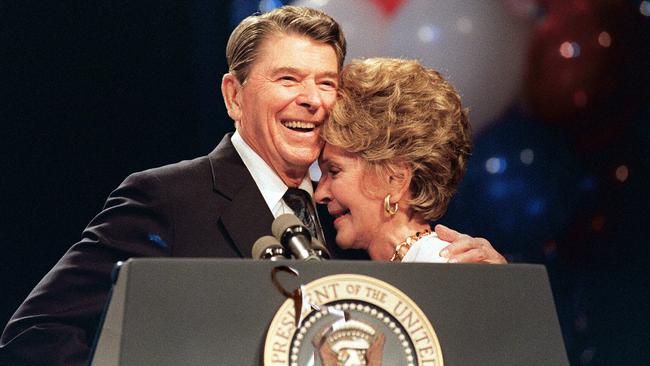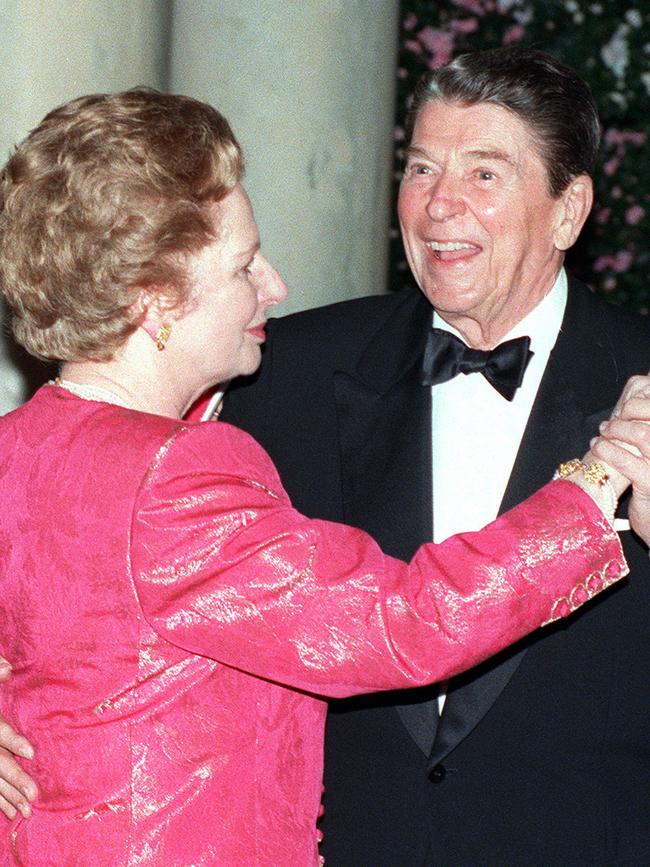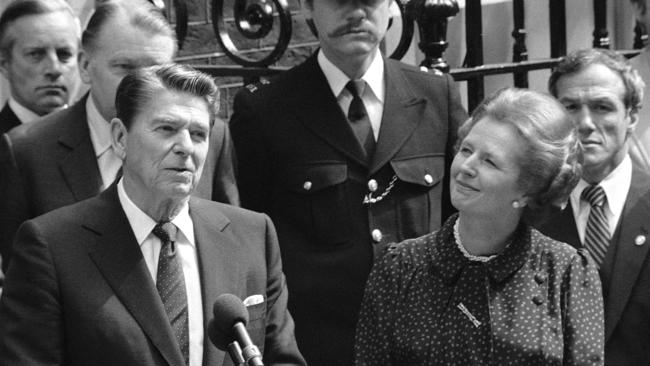Why Thatcher and Reagan should still matter to us all
Only the ignorant and stubborn would mock the mere mention of two of the 20th century’s most radical and successful leaders.

If Hawke admired Thatcher and Reagan, it goes without saying that a Liberal treasurer would do the same. Especially as Australia faces an unprecedented economic calamity from the COVID-19 pandemic.
“The reality is that Thatcher and Reagan cut red tape and cut taxes and delivered stronger economies,” Josh Frydenberg said on The ABC’s Insiders last weekend, explaining why he draws inspiration from the former British prime minister and former US president. “Thatcher and Reagan are figures of hate for the Left because they were so successful.”
.@JoshFrydenberg on taking inspiration from Thatcher and Reagan:
— Insiders ABC (@InsidersABC) July 26, 2020
"Thatcher and Reagan are figures of hate for the left because they were so successful. One got two terms, which was the maximum that you can get in the US. Margaret Thatcher got 11.5 years." #Insiders #auspol pic.twitter.com/BNBTRd9Cid
Cue hatred from the Left. The World Socialist Website would regurgitate old nonsense that “the Reagan-Thatcher agenda was enforced through a violent assault on the working class.” But it is unfortunate that the current leaders of the Labor Party cannot manage to do what Hawke did more than 30 years ago.
The kneejerk smackdown of Thatcher and Reagan by Anthony Albanese and his shadow treasurer Jim Chalmers suggests they are bereft of a curiosity and intellect that allowed Hawke to admire two maverick leaders on the other side of politics.
Could ACTU leader Sally McManus do what Hawke, a former ACTU leader, did? Not a chance.
Frydenberg’s comments about the supply-side revolutions of Thatcher and Reagan served two purposes. It kicks off precisely the debate Australia needs as we confront the worst recession since World War II. And it reminds us that only the historically ignorant, and ideologically stubborn, would mock the mere mention of two of the 20th century’s most radical, and successful, leaders.

Fifty years ago, the Iron Lady challenged socialism, stared down powerful unions, believed in small business, and transformed not just her own dusty Conservative Party, but the Labour Party too. Without Thatcherism, there would have been no Blairism.
You don’t have to agree with everything the Iron Lady did to recognise her tremendous success. Thatcher was not at her best when she said “there’s no such thing as society. There are individual men and women and there are families.” Though meant as a juxtaposition to socialism, her throwaway line led future Tory leaders to steer clear of Maggie, rather than try to emulate a leader who transformed a moribund British economy, instilling in the British a spirit of entrepreneurship and new-found confidence.
Thatcher’s homespun beliefs were rooted in pragmatism. Her former policy adviser and speechwriter John O’Sullivan described her as “a well-brought-up Methodist girl whose favourite religious quotation was John Wesley’s ‘earn all you can; save all you can; give all you can’.
“Her revolution was provincial before it conquered the world; it was a moral revolution before it was an economic one.”
Thatcher’s policy to allow occupiers of council houses to buy them was central to her belief in empowering individuals. It’s a far cry from throwing money at people to spruce up a dowdy bathroom or add a new garage.
Similarly, Thatcher’s privatisation program was so successful in getting rid of bloated bureaucracies, spurring growth and improving living standards that it was copied across the world by more than 100 countries.

Though far from perfect — who can forget the ill-conceived poll tax? — Thatcher delivered enough big-bang financial reforms to turn the “sick man of Europe” into a country that, by and large, enjoyed decades of uninterrupted economic growth.
Reagan did the same. His belief that high taxes discourage people from working more and undermine growth and investment led him to return hundreds of millions of dollars to the middle and working classes by indexing tax brackets, followed by an across-the-board 25 per cent reduction in tax rates, closing loopholes and reducing the number of tax brackets to two: 15 per cent for the middle class and 28 per cent for the rich.
The results? In the 1980s, growth exceeded 6 per cent. By the end of the decade, Reagan’s tax cuts increased tax revenues from $500bn to $1 trillion. Heritage Foundation founder Edwin J. Feulner recalled the Gipper’s customary wit: “I knew my ideas were working when the media stopped calling it Reaganomics.”
Reagan wasn’t perfect either, leaving office with record deficits and debt, and bigger, not smaller, government. But, as Frydenberg alluded to last week, increased military spending defeated the Soviet Union and defended a little thing called freedom.

If a Liberal politician can’t draw inspiration from the achievements of Thatcher and Reagan, they might be more at home in the Labor Party today.
It certainly struck an odd chord when the Prime Minister walked a million miles from two political giants from his own side of politics. Refusing to back up the Treasurer, Scott Morrison said we must seek “a uniquely Australian response” to the current economic crisis. It’s all about jobs, he said.
The PM’s motherhood statement tells us nothing about his core beliefs. We all want an economy that creates more jobs. The diabolical number of Australians without jobs, or enough work, makes it critical that voters understand Morrison’s beliefs about building that economy.
This is why Thatcher and Reagan still matter. Like a bower bird, a mediocre politician will pick up an idea or two to try to attract voters. Thatcher and Reagan were conviction politicians whose instincts served them well. They tested their core beliefs against ideas and succeeded because they were able to explain their beliefs to voters.

No one is suggesting that the policy framework of Thatcher or Reagan be overlaid holus bolus onto the Australian economy. Some of it has already been done, from privatisations to opening the economy to competitive forces abroad. But their core beliefs in the power of lower taxes, private ownership, individual responsibility and free markets to empower and serve the interests of ordinary folk could do with a 21st-century revival. Just don’t count on economists and other boffins in Treasury to lead that overdue task.
For all the books and expert analyses of the Thatcher and Reagan legacies, a letter writer to The Wall Street Journal summed it up best a few years ago. Recalling his visit to London in April 1979, this chap from Statesville, North Carolina, wrote: “I had just turned 30 and thought I knew everything. I was in a shop buying my wife a gift. The shopkeeper, a middle-aged lady, asked: ‘Do you know what’s wrong with my country today?
“ ‘In my country,’ she said, ‘when a young man like you is crossing the street and a fancy, new car comes barrelling through, he sneers at the car, as he jumps back onto the kerb and says: ‘That so and so. What right does he have to be driving a car like that?’ In your country that same young man jumps back onto the kerb and smiles and says: ‘I am going to have one of those one day.’
“Margaret Thatcher changed that entire perspective and, like President Reagan, made her constituents feel good again about their country and their prospects … Her example should make us realise that all that stands between us and better times, when we feel we are drowning in a maelstrom of entitlement, bureaucracy and self-serving government, is the right leader.”

Frydenberg has spent many years talking about the inspiration he draws from Thatcher and Reagan. As Treasurer, he can start to walk the walk. The worst outcome would be to fire up ideologues such as McManus and to let down mainstream Australians by not fighting for reforms to invigorate our sluggish economy.
So far, Frydenberg has overseen some personal tax cuts, accelerated tax cuts for small business, overhauled environmental regulation, and allowed Australians to access their own money from superannuation accounts. None of this is on par with the big-bang economic reforms of Thatcher and Reagan. But they were in the top job, after all.






It often pays to dip into some history when mapping out the future. At a press conference in January 1989, when prime minister Bob Hawke was offered a chance to pan two great leaders, Hawke said: “I have had my differences with Margaret Thatcher and President (Ronald) Reagan but there are elements in their leadership which are to be admired. Indeed … when the history books are written, President Reagan will go down as one of the great presidents of the United States.”